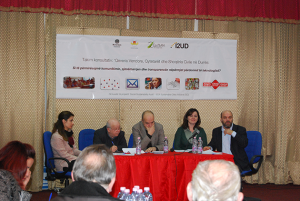Social Sustainability Audit
 Implementation Period: July 2012 – March 2013
Implementation Period: July 2012 – March 2013
Donor: World Bank Institute
Fund: 109,890 USD
Implemented in: Durrës (AL) Prishtina (KS), Skopje (MK), Sarajevo and Banja Luka (BiH)
Implemented by: Co-PLAN
The ‘Social Sustainability Audit”, financed by the World Bank, and implemented in partnership by Co-PLAN and the Institute for International Urban Development (US) had in focus the challenge of sustainable development and social marginalisation . The project, which was simultaneously implemented in five regional cities – Durrës (AL), Prishtina (KS), Skopje (MK), Sarajevo and Banja Luka (BiH), aimed to increase the knowledge and awareness of social accountability among city stakeholders and to strengthen the integrity of public services in all five cities. Co-PLAN and I2UD were assisted by local city teams in each of the cities, for the accomplishment of the project stages: Archis Intervention Prishtina (Kosovo), Coalition for Sustainable Development (Macedonia), and US Alumni Association (Bosnia Herzegovina).The audit also aimed to assess the current social accountability mechanisms in place in the municipalities and opportunities and constraints to developing new approaches and ICT tools that improve collaborative governance at the city level.
For 2012, the project consisted of research work, focus groups and participatory scenario development workshops, with main highlights as follows:
- Analytical profiles for each of the cities were conducted focusing on social accountability issues, public service provision and social inclusion in the city.
- At least 12 focus groups were held in each city with vulnerable groups representatives, and 31 in-depth interviews with interest groups were conducted. Findings of both processes were synthesized in a detailed report for each city.
- 5 participatory scenario development workshops were organised, withe participation of various interest groups including community, government authorities and business sector,and a number of mechanisms were proposed to improve current levels of social accountability through the use of ICT.
